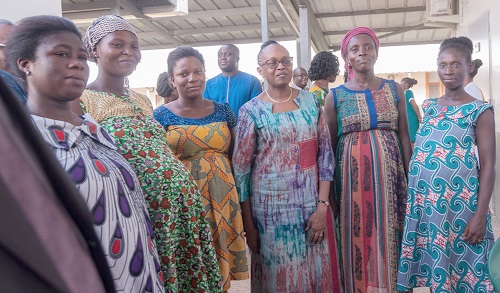Ghana News | Ghana Politics | Breaking News in Ghana

GHS Pregnancy School concept commendable initiative
Ordinarily, pregnancy is a natural process of bringing to life a new human being called a baby for the continuity of procreation and for that matter humanity.
Be that as it may and albeit, pregnancy may look a simple thing but it comes with numerous complications such as pregnancy induced hypertension, gestational diabetes, eclampsia, postpartum hemorrhagic, anaemia, oligohydramnios, placenta previa, abruptio placentae, malpresentations, among others, that become the direct causes of maternal deaths and stillbirths.
Advertisement
It is in this vein that it is important to detect danger signs in pregnancy early to facilitate swift medical interventions that prevent maternal deaths or stillbirths or both.
Early detection of danger signs in pregnancy is a shared responsibility for families and healthcare providers. Accordingly, families or pregnant women themselves must first identify certain changes in their conditions and be present at a health facility for treatment. Healthcare providers must also be able to accurately diagnose the condition and provide the most appropriate and timely treatment for it.
High maternal mortality
High maternal mortality ratios in Africa and for that matter Ghana constitute a huge societal burden in diverse ways. Commenting on the maternal mortality menace in Sub-Saharan Africa (SSA) for example, Kwalombota (2012) stated inter alia, “…women living in SSA are nearly 200 times more likely to die during pregnancy and childbirth than women living in developed countries…”
In a bid to address the high maternal mortality ratios (MMR), Ghana introduced the free maternal healthcare policy about 12 years ago. A few years ago, the Ghana Health Service (GHS) also introduced the pregnancy school concept to augment the free maternal healthcare policy implementation and the existing treatment regime at the antenatal clinics.
According to Korto (2019), the free maternal healthcare policy is primarily meant to address the problem of high MMR in Ghana by reducing financial barriers to the utilisation of maternal and child healthcare services.
The GHS pregnancy school concept involves a gathering of pregnant women, their spouses or relatives and health workers to discuss pregnancy-related topics, including but not limited to danger signs in pregnancy and how to prevent or treat them. In general, the main agenda for the pregnancy school is maternal healthcare and safe motherhood.
According to Vanotoo (2016), the main objective of the pregnancy school concept of the GHS is to “create a forum for the provision of relevant information on pregnancy and newborn care to pregnant women and their families in a friendly environment and to involve male or husband participation in maternal and newborn healthcare, including family planning.”
Educating pregnant women
As such, the pregnancy school offers the healthcare providers, especially Obstetricians and Midwives, the opportunity to educate pregnant women and their families regarding antenatal care, pregnancy complications, delivery and postnatal care. Suffice to say that the pregnancy school is a bigger platform than the antenatal clinics. It provides a question-and-answer session for families to learn from healthcare providers and to demystify some of the strange beliefs regarding danger signs in pregnancy.
One may say with a significant margin of certainty that the GHS pregnancy school is a laudable initiative that provides free maternal health information and advice to pregnant women and their families. The concept constitutes a preventive measure in tackling institutional maternal mortality.
To this end, I call on all benevolent organisations to support the GHS pregnancy school concept to make quality maternal healthcare highly accessible to people of reproductive age.
It also behooves pregnant women and their families to take advantage of the GHS pregnancy school concept, for it is a useful initiative.
Husbands must also accompany their pregnant wives to both antenatal clinics and the pregnancy schools to become more educated on reproductive healthcare issues.
Perhaps if every pregnant woman takes antenatal care seriously and take advantage of the GHS pregnancy school, the number of institutional maternal deaths would be minimal. However, I admit the inevitability of death and the fact that sometimes healthcare providers make relevant interventions to prevent death from occurring but it unfortunately occurs. Be that as it may, certain deaths are preventable.
In conclusion, I hereby commend the GHS for this out-of-the-box initiative. I equally encourage quasi-government, faith-based and private health facilities to emulate the GHS pregnancy school concept, if only they have not done so already.
The writer is a Health Service Administrator. Email: [email protected]





